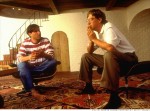Browsing the Web, you find almost no Microsoft file formats. After 10 hours of browsing, I had not seen a single Word .DOC, AVI file, Windows .EXE (other than content viewers), or other Microsoft file format. I did see a great number of Quicktime files. All of the movie studios use them to offer film trailers. Apple benefited by having TCP support before we did and is working hard to build a browser built from OpenDoc components. Apple will push for OpenDoc protocols to be used on the Internet, and is already offering good server configurations. Apple’s strength in education gives them a much stronger presence on the Internet than their general market share would suggest.
Another popular file format on the Internet is PDF, the short name for Adobe Acrobat files. Even the IRS offers tax forms in PDF format. The limitations of HTML make it impossible to create forms or other documents with rich layout and PDF has become the standard alternative. For now, Acrobat files are really only useful if you print them out, but Adobe is investing heavily in this technology and we may see this change soon.
Acrobat and Quicktime are popular on the network because they are cross platform and the readers are free. Once a format gets established it is extremely difficult for another format to come along and even become equally popular.
A new competitor “born” on the Internet is Netscape. Their browser is dominant, with 70% usage share, allowing them to determine which network extensions will catch on. They are pursuing a multi-platform strategy where they move the key API into the client to commoditize the underlying operating system. They have attracted a number of public network operators to use their platform to offer information and directory services. We have to match and beat their offerings including working with MCI, newspapers, and other who are considering their products.
One scary possibility being discussed by Internet fans is whether they should get together and create something far less expensive than a PC which is powerful enough for Web browsing. This new platform would optimize for the datatypes on the Web. Gordon Bell and others approached Intel on this and decided Intel didn’t care about a low cost device so they started suggesting that General Magic or another operating system with a non-Intel chip is the best solution.
Bill Gates wrote this in 1995 in a memo to Microsoft execs. He also talks about the development of the internet and the technology behind it, as well as future plans for Microsoft to start being internet-aware. It’s long and fabulous and even has a “hotlist of Internet Web sites” at the end!
Courtesy of Letters of Note and Donelle Gan.

